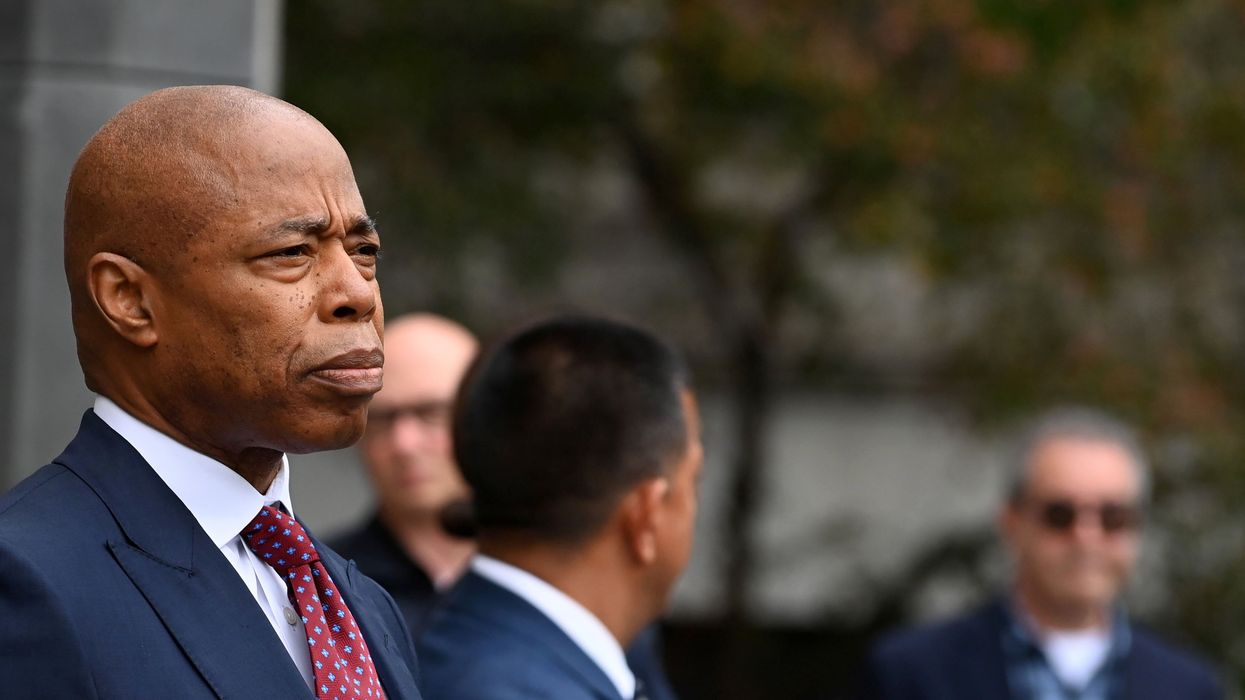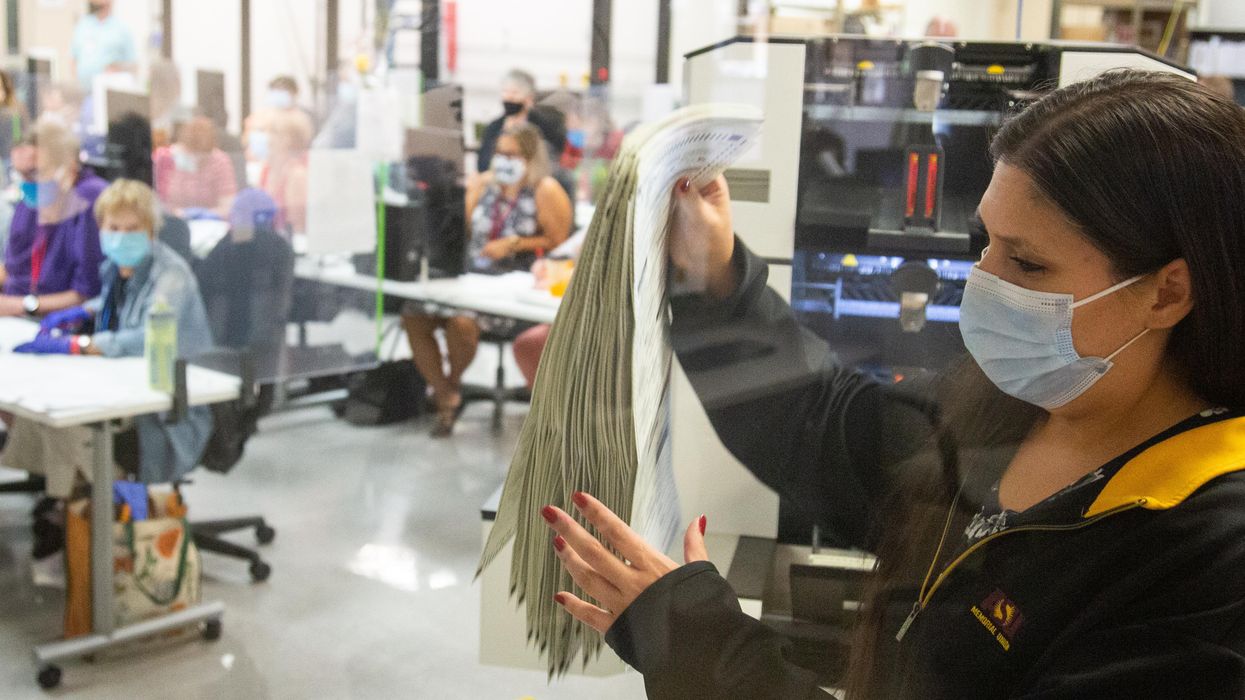Independent Voting recently hosted the 20th Annual Anti-Corruption Awards honoring Farhad Mohit, Gaby Cardenas and Katherine M. Gehl.
Video: The 20th annual anti-corruption awards
The 20th Annual Anti-Corruption Awards

New York Mayor Eric Adams is seen leaving Manhattan federal court on Sept. 27.
Cupp is the host of "S.E. Cupp Unfiltered" on CNN.
It’s the go-to play nowadays.
If you’re a politician collared for alleged crimes, feign indignation, call it a “conspiracy,” blame the “corrupt” Department of Justice, and refuse to resign.
New York Mayor Eric Adams has been indicted on five federal charges related to 2021 campaign contributions, wire fraud, and bribery. The scathing 57-page indictment was unsealed on Thursday, and according to the U.S. attorney for the Southern District of New York, Damian Williams, Adams was “showered” with gifts from foreign entities — namely Turkey — that he knew were illegal.
According to the indictment, there was luxury travel, free airline tickets, meals and hotel rooms from Turkish officials, and Adams allegedly tried to hide the gifts, the value of which exceeded $100,000 — all in return for political favors.
Adams is innocent until proven guilty. But the SDNY isn’t dumb.
As my CNN colleague Elie Honig, a former state and federal prosecutor, said, “I’m going to put this real unscientifically for you: if you’re going to charge the sitting mayor of New York City, you better be damn sure that you have the evidence on him, because if you don’t, it will be a disaster.”
But gone are the days of bowed-head press conferences and resignations in the wake of painful, costly, ugly and damaging scandals. So Adams has done what others before him did — some unsuccessfully, one very successfully.
First, he denied all charges and called them “lies.”
“My fellow New Yorkers, it is now my belief that the federal government intends to charge me with crimes. If so, these charges will be entirely false, based on lies.”
Then, he tried to claim he was being “targeted.”
“I always knew that if I stood my ground for all of you, that I would be a target, and a target I became.”
Then, he pointed fingers.
“Exactly who in the federal government, White House, do you say is targeting you for speaking out,” he was asked by one reporter.
“I think you need to ask the federal prosecutors who gave the directive and the orders, I don’t know. But we should ask them who gave the directive and orders that we’re going to take on and create this group of lies? They have the answer to that question.”
And finally, he refused to resign and let the people of New York get on with their business, instead insisting on dragging them into what will undoubtedly be a political circus that will unquestionably affect his ability to do his job.
But no matter — Adams is trying a play that was popularized by Donald Trump over decades. Deny, blame, deflect.
Over the course of his multiple indictments for alleged crimes during and after his presidency, Trump has blamed the “corrupt” DOJ, even going so far as to name and smear attorneys, judges, clerks, and their family members.
Many of those folks have endured death threats and harassment because of Trump’s baseless attacks.
Anyone can see how dangerous these attacks are, but Trump has so far managed to avoid prison, a trick others seem all too willing to try.
New Jersey Sen. Bob Menendez tried it after he was indicted for a panoply of crimes, including corruption, conspiracy to act as a foreign agent, and obstruction of justice. For months he asserted his innocence, called the charges a conspiracy, and refused to resign.
In January, he had this to say: “The United States Attorney’s Office has engaged not in a prosecution, but a persecution. They seek a victory, but not justice.”
In July a jury found him guilty of all charges.
To believe these greedy, self-serving conspiracies, you’d have to ignore the fact that in fewer than four years, the Biden DOJ has indicted seven Democrats — including his own son!
But they’re not meant to make sense, only to enrage and tug at the conspiratorial impulses of a voter base that is now all too used to hearing tales of “rigged” and “stolen” elections, “the deep state,” and a “corrupt DOJ.”
To save their own political hides, Trump, Menendez and now Adams are shamelessly willing to smear and undermine these institutions to the point of breaking them.
And it’s working. Average confidence in institutions is at a pathetic 28%, with just 8% of Americans having “a great deal” of confidence in the criminal justice system. Forty-two percent have “very little.”
Among all the detritus and wreckage of the Trump era, this is one of his most enduring legacies — a playbook for politicians to try to save themselves by throwing everyone else under the bus. Including America herself.
©2024 S.E. Cupp. Distributed by Tribune Content Agency, LLC.
Maricopa County (Ariz.) Elections Department staff count votes on Nov. 5, 2020.
Herbits is an American businessman and former consultant to several secretaries of defense.
Former President Donald Trump has not yet committed to accepting the results of the 2024 election. He continuously maintains that the 2020 election was stolen, despite 60 failed lawsuits. And his behavior on Jan. 6, 2021 demonstrates beyond any doubt that he has no sense of responsibility to democracy.
Moreover, report after report reveals various tactics that his supporters around the country are preparing so they can to prevent him from losing again this time — focusing on voting constraints and ballot processing.
For instance, the nonpartisan Center for Responsibility and Ethics in Washington has identified at least 35 election officials in place for the 2024 election who were 2020 election deniers.
North Carolina’s State Board of Elections, with a 3-2 Republican majority, has empowered each county board to demand further information before certifying vote totals. Potential delays could prevent North Carolina certification and possibly throw the election to the House of Representatives.
The greatest and, frankly, likeliest threat is the hyperpartisan Supreme Court — perhaps the most political court since the Taney Court’s decision in the 1847 Dred Scot decision, which led in a straight line to the Civil War. Through any number of tactics, this court can hold up the results of cases long enough to prevent any candidate from winning 270 Electoral College votes. If that happens, the next president would be elected by the House of Representatives, where each state delegation gets one vote.
The Supreme Court has original jurisdiction when there are differences between states. However, any of the 13 appellate courts may make a decision in favor of the citizens or the state where a case has been decided at the local level and then appealed, possibly all the way to the Supreme Court. Given Chief Justice John Roberts’ history of slow-walking cases in favor of Donald Trump, that is a real possibility. If the Supreme Court does not apply a final decision before Jan. 3, 2025, when the Electoral College meets, he has created a sure route to a Republican victory in the House.
Why would the justices do that? Look at Roberts’ record — an amplification of the Taney decision. He has systematically undermined the one person, one vote premise by a series of decisions: Citizens United, Shelby County and others. (See the detailed report of the nonpartisan Campaign Legal Center.
The federal government has a duty to assure safe and fair elections. Given the last four years, it should undertake to ensure vote counting can be watched from a segregated area. While the Associated Press and its stringers are likely to be witnesses to the counting of the ballots, where is the U.S. government? Why not have the FBI, DEA, AFT, Secret Service and other federal agencies assign their own witnesses to watch the counting so that they, with their credibility, may be called as witnesses in cases that do go to court.
Such an effort by federal agencies to assign observers, without authority to act, would not require congressional approval. It is not unusual for such agents, as it is for police officers everywhere, to observe an event where they may be troubling behavior. Were an incident to occur, the federal agent would not have any authority to act; but their observations as a witness in a courtroom would be like those of any other citizen, though likely to carry a degree of integrity that would be welcome.
Sixty some cases were filed in 2020. We can expect even more this year given the prominence of election deniers. These respected officials' testimony may be helpful for the courts and juries to make better decisions.
None of these individuals should, of course, be present during the actual voting process itself. Most states permit representatives of both parties to be in the voting rooms, both to watch the process and to assist voters where questions arise before ballots are cast.
I have served over the years in such a capacity. In one egregious case, I had to call a state emergency number to have white uniformed police officers removed for standing on the steps to the precinct voting room in a completely Black neighborhood in complete violation of voter intimidation regulations.
Every step we can take to protect the right to vote should be considered, especially given the temperature of this year’s election.

Experts' perception of public-sector corruption in the United States has not improved in the past year.
Meyers is executive editor of The Fulcrum.
The United States has done little to improve its battle against public-sector corruption in recent years, according to Transparency International, which measures experts’ perception of corruption around the world. For the second year in a row, the U.S. ranks 24th out of 180 countries and territories.
The United States scored 69 out 100 on the group’s 2023 Corruption Perceptions Index, the same score as last year and a mere two-point improvement on 2020 and 2021.
“Despite important strides taken by this Congress and this Administration to combat transnational corruption, it is clear more needs to be done to curtail corruption in the U.S.,” said Gary Kalman, executive director of Transparency International U.S. “As the world's leading economy and a major democracy, we should strive for governance and transparency ratings that reflect our global standing.”
However, the United States did stand out as a leader in judicial independence – the focus of the latest report, released Tuesday.
Transparency International noted the Supreme Court has come under intense criticism for adopting an ethics code that lacks an enforcement mechanism in response to media reports exposing a lack of transparency among some justices. However, the group believes the U.S. judicial system has survived multiple political attacks and remains an example for the rest of the world.
“Attacks on the independence of the US federal and state judiciaries have largely failed, and cases against politically connected individuals have proceeded without effective interference,” the report states. “For example, credible legal cases against a former US President and against the current President’s son are moving forward through appropriate and independent judicial channels.”
The United States achieved its highest score in 2015 (75 out of 100, good for 16th place). The highest ranking for the U.S. was 14th in 2000. (Transparency International, which launched the index in 1995, changed the scoring system in 2012.) Generally, the United States has ranked in the high teens or the 20s.
Transparency International praised the U.S. for taking the steps in recent months to stem both domestic corruption and the flow of international corruption through American financial centers.
Kalman praised the federal government for taking these steps, saying the United States can have a “truly global impact.”
But there is much more the United States can do to continue the battle against corruption, according to Transparency International U.S. Advocacy Director Scott Gretytak. And that work will require compromise from Republicans and Democrats.
“There is bipartisan legislation to extend our anti-money laundering laws to the lawyers, accountants and corporate service providers who serve as gatekeepers to our financial system,” he said. “Covering these enablers of illicit investment in the U.S. is the single most significant anti-money laundering policy reform facing Congress.”
This year, the United States is tied with Barbados, just behind Austria, France, Seychelles and the United Kingdom, and just ahead of Bhutan and the United Arab Emirates.
Denmark (score of 90 this year), Finland (87) and New Zealand (85) have been the top three countries every year since 2011, with Denmark holding the top spot in all but two of them. However, none of those countries are perfect. A recent report by Transparency International noted that banks in Denmark, among other European Union countries, have contributed to money laundering. The EU is creating a new agency to fight such crimes.
The countries with the worst scores are Somalia (11) and Venezuela, Syria and South Sudan, all with 13 points.
The average score among 32 countries in North and South America was 43. The United States and Barbados tied for third in the region, behind Canada (76) and Uruguay (73.)
Scores are based on data drawn from more than a dozen corruption surveys and assessments. Sources include the World Bank and the World Economic Forum.
Logis, a former member of the Republican Party and conservative pundit, is the founder of Perfect Our Union, an organization dedicated to healing political traumatization and building diverse, pro-democracy alliances. This is the first in a series of articles titled “Ask Rich.”
I left MAGA in the summer of 2022. As we get to know each other, I'll get into more specifics as to why I left. Yes, I did agree with some of former President Donald Trump's policies; and, I assure you, most Trump voters are good, decent people who had some valid reasons for supporting him. However, I feel I was led astray, but accept full responsibility for my decisions.
When my doubts about supporting Trump and the MAGA movement commenced in summer 2021, I began diversifying my news, opinion and information sources; this dramatically bettered my understanding of the nuances of complex political, cultural and social issues.
With that in mind, here’s what readers can expect from "Ask Rich":
I want “Ask Rich" to engage both those who oppose MAGA and Trump as well as those who offer support. It is this type of dialogue — with those of strongly divergent views, respectively exchanging ideas — that will result in perfecting our Union and democracy.
“Ask Rich” will allow citizens with varying views to express their opinions, share experiences and learn from each other. By doing so, We the People (myself included) will come to understand that, despite our differences, we all love our country and that we agree more than we disagree. Acknowledging this will make us more invested in our democratic (lowercase d), republican (lowercase r) self-government.
Dating back to the earliest years of our republic, unlikely but necessary alliances were formed when unity was non-negotiable. It is time for us to, again, forge those alliances.
The history of our nation has often been accompanied by struggle. But we have endured nearly a quarter of a millenium, during which time other democracies collapsed. With the help of good Americans from all sides of the political spectrum, we can meet today’s challenge.
You, the readers, deserve solutions that rise above the usual tribalistic frays. Each week, I’ll ask you to offer thoughts on a few questions. I’m excited to get started, and certain to be humbled by all the lovers of the country I’ll meet.
I’ll conclude with quote from Thomas Jefferson:
“... difference of opinion leads to enquiry, and enquiry to truth.”
That is my goal.
Have a question for Rich? Send an email to AskRich@thefulcrum.us.
Marco Rubio is the only adult left in the room